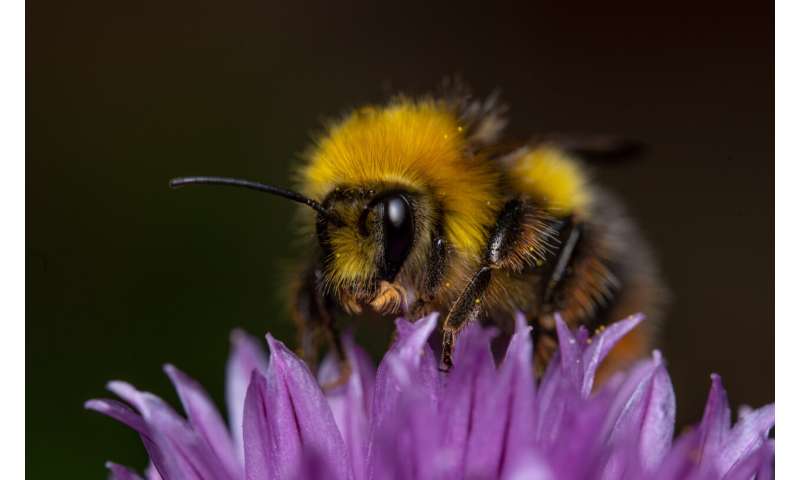The conservation of moths is equally essential as that of bees.

June 4, 2023
This article has been reviewed according to Science X's editorial process and policies. Editors have highlighted the following attributes while ensuring the content's credibility:
- fact-checked
- peer-reviewed publication
- trusted source
- proofread
by University of Sheffield
Night-time pollinators, such as moths, may visit just as many plants as bees and should also receive conservation and protection efforts, according to a new study from the University of Sheffield.
The study discovered that moths, under pressure from urbanization, may be less resilient than bees due to their complex life cycle and specific plant requirements. However, it also revealed that moths play a crucial role in supporting urban plant communities, accounting for a third of all pollination in flowering plants, crops and trees.
The researchers suggest that when developing or planning urban areas, it is essential to introduce plant species beneficial for both moths and bees. This approach is crucial to support the health of urban ecosystems.
Dr Emilie Ellis, the lead author from the University of Sheffield's Grantham Institute for Sustainable Futures, and now the Research Centre for Ecological Change (REC) at the University of Helsinki, said, "Our study found that in more urbanized areas, the diversity of pollen being carried by moths and bees decreases, meaning that urban pollinators may have limited flower resources available to them."
"As moths and bees both rely on plants for survival, plant populations also rely on insects for pollination. Protecting urban green spaces and ensuring they are developed in such a way that moves beyond bee-only conservation but also supports a diverse array of wildlife, will ensure both bee and moth populations remain resilient and our towns and cities remain healthier, greener places."
In the study, Dr Ellis and her co-authors showed that bees and moths are visiting significantly different plant communities. Along with the usual pale and fragrant flower species, moths were found to be carrying more pollen than previously thought and visiting more types of tree and fruit crops than previously identified.
In urbanized areas, there can sometimes be an overabundance of non-native plant species, or just an overall reduction in the diversity of plant species, resulting in lower insect interactions for less attractive plant species. This negatively affects both plant and insect populations.
Dr Ellis says the research demonstrates how crucial moths are at pollinating plants, including crops. She highlights implications for wildlife-friendly gardening initiatives, urban planners, and policy makers responsible for developing urban green spaces such as parks or urban horticulture.
Dr Stuart Campbell, from the University of Sheffield's School of Biosciences, and a senior author on the study, said, "Most plants depend on insects for pollination, but knowing which insects do the pollinating is actually a really difficult question to answer. There are about 250 species of bee in the UK, and we know quite a bit about some of these species, but we also have over 2,500 species of moth which visit flowers mostly at night. So, as you might expect, we know a lot less about these."
"What we were able to do in this study is use DNA sequencing to identify the pollen that gets stuck to night-flying moths when they visit flowers. We found that moths are probably pollinating a range of plant species, many of them wild, that are unlikely to be pollinated by bees—and vice versa. It's clear from this study that pollination is achieved by complex networks of insects and plants, and these networks may be delicate and sensitive to urbanization."
'We can also learn which plant species might be the best sources of food for different insects, including nocturnal ones like adult moths, and use that information to better provide for all our pollinators.'
The findings were published in Ecology Letters.




